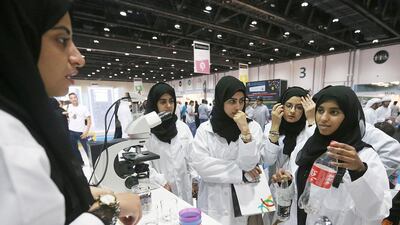Hundreds of young people representing 58 countries will participate in the Expo-Sciences International 2019 at the Abu Dhabi National Exhibition Centre next month.
This year’s competition is expected to have 1,500 participants between the ages of nine to 25. Children will present 700 science projects in 13 categories, including biology, behavioural and social sciences, chemistry, computer science, earth science, energy and transport, engineering, environmental analyses and environmental management, electric and mechanical technology, mathematical science, medicine and health, physics and astronomy, technology and biotechnology.
It is the first time the event, which runs from September 24 to 26, has come to the capital since 2013.
“We are delighted to provide a platform for young minds from all over the world, including the UAE, to collaborate and share ideas here in Abu Dhabi,” said Mubarak Al Shamsi, the director general of Abu Dhabi Centre for Technical and Vocational Education and Training, in a statement.
“We are committed to the country’s vision to advance scientific innovation and education across key sectors and nurture the talent of young people to affect positive change and present solutions to modern-day challenges.”
ESI is a created by the International Movement for Leisure Activities in Science and Technology, a non-governmental, non-profit youth organisation dedicated to fostering scientific learning among youth.
The event is free. Schools can register to visit through the website until September 19.

